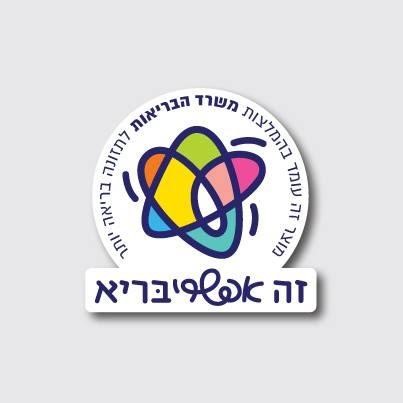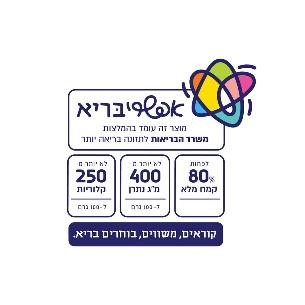
This product satisfies the Ministry of Health recommendations for healthier nutrition
It’s EfshariBari
Want to eat healthier?
Look for the EfshariBari label on bread bags
In 2014, a unique and groundbreaking move was launched in the Israeli food market, which continues today: the “EfshariBari” label. Initiated by the Department of Nutrition and Food Service of the Ministry of Health, and within the framework of the National Program for an Active and Healthy Lifestyle “EfshariBari”, the label was designed to enable consumers make healthier choices at retailers, encourage production and consumption of healthier breads and thus affect prices.
This innovative voluntary regulation was devised to help consumers make informed choices about nutritionally preferable foods, rich with essential nutrients and less harmful components – and at the same time help manufacturers who satisfy these standards receive official recognition from the Ministry of Health and the National Program for Active and Healthy Lifestyle.

This product meets Ministry of Health recommendations for healthier nutrition
It’s EfshariBari
EfshariBari label: label on the front of packaging

EfshariBari
This product satisfies Ministry of Health recommendations for healthier nutrition
At least 80% wholegrain No more than 400 mg sodium per 100 g No more than 250 calories per 100 g
Read, compare and choose healthy
EfshariBari label: label on the back of the bag
What is required in order to receive an EfshariBari label?
Bread (or roll, or pita), bearing the “EfshariBari” label – was found to meet the specifications set by the Nutrition Division and Food Service of the Ministry of Health:
- At least 80% wholegrain
- No more than 250 calories per 100 g
- No more than 400 mg sodium per 100 g
Important
- Using the label is contingent upon prior approval by the Ministry of Health, and manufacturers and resellers will not be required to incur any costs.
The Ministry of Health has called on consumers to buy bread products, rolls and pitta breads bearing the EfshariBari label and to check that in educational institutions and children's after school facilities they serve bread and baked goods bearing the label. The nutritional regulations in after school clubs and schools set by the Ministry of Health and the Ministry of Education also require operators and catering companies to provide healthier baked goods – made of whole wheat flours.
Video: Healthy sandwich - Whole wheat bread (Hebrew)
A special examination of retailers in September 2017 revealed that:
- The label can currently be found on about 100 products (breads, rolls and pita) that make up about 40% of the food category in large, medium and small manufacturers, cafes and supermarkets.
- Most breads in the places tested are whole flour! The percentage of whole wheat breads from total bread products on shelves in the networks tested is about 61% in the Shufersal chain, 68% in the Osher-Ad chain and about 88% in Rami Levy 'HaShiqma' marketing chain.
- The EfshariBari label appears on more than half of the products in the category (42% at Osher-Ad, 56% at Shufersal and 73% at Rami Levy).
- Comparing prices of whole wheat breads shows that the average price in 2014, before launching the EfshariBari label, was 17.5 ILS and the price in 2017 was 13 ILS, a decrease of about 25%!
- The criteria underpinning the label (detailed below) have created a new standard for industrial product development and have changed supply for consumers.
- Of the breads that do not carry an EfshariBari label - some of them meet some of the criteria: For example, full-grain bread but with high sodium content (over 400 mg) or calories (over 250) per 100 grams.
- The Food Service of the Ministry of Health conducted a sample test to clarify manufacturers' statements on which the label was given, all products and manufacturers tested met the criteria as stated.
Hence the great importance of the label to consumers. It allows quick, immediate and clear selection of healthier breads and pastries, without a thorough reading of ingredient lists and nutritional value tables, it greatly reduces the fear of counterfeiting (adding caramel or other colorants to breads to look like whole flours) and is a standard for the products of the industry.
Video: EfshariBari label (Hebrew)
How do you receive the label?
EfshariBari Label – guidelines at the Ministry of Health Website (Hebrew)
Guideline no. 41522152 from the Food Service – “It’s EfshariBari” food label (Hebrew)



